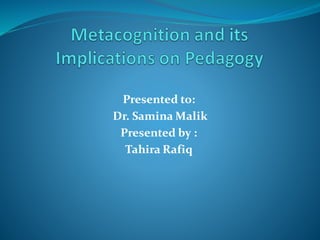
Metacognition and its Implications on Pedagogy
- 1. Presented to: Dr. Samina Malik Presented by : Tahira Rafiq
- 2. Objectives To understand the meaning of metacognition To understand the strategies of metacognition To understand the metacognitive strategies in the classroom
- 3. DEFINITION OF METACOGNITION Metacognition has been defined as “one’s knowledge concerning one’s own cognitive processes or anything related to them” (Flavell, 1976, in Kaplan et al., 2013) and is commonly referred to as “thinking aboutone’s thinking”. According to metacognitive theories, metacognition includes two domains: knowledgeof cognition and regulationof cognition (Schraw & Moshman, 1995).
- 4. Flavell’s Model of Cognitive Monitoring Flavell’s (1979) model of metacognition is the foundation for research in the field of metacognition today. According to his model, there are four categories: (1) Metacognitive knowledge, (2) Metacognitiveexperiences, (3) Goals/tasks, (4) Actions/strategies.
- 5. METACOGNITIVE READING STRATEGIES Strategies specific to reading can be classified in the following three clusters of metacognition: 1. Planning strategy 2. Monitoring strategy 3. Evaluating strategy (Israel, 2007; Pressley & Afflerbach, 1995).
- 6. Metacognitive Reading Strategies are classified into three groups of planning (pre- reading)monitoring (during reading) evaluating (post-reading)strategies and each group has a variety of strategies that require readers’ metacognitive processing.
- 7. The Two Processes of Metacognition Many theorists organize the skills of metacognition into two complementary processes that make it easier to understand and remember. Knowledge of cognition has three components: knowledge of the factors that influence one’s own performance; knowing different types of strategies to use for learning; knowing what strategy to use for a specific learning situation. Regulation of cognition involves: setting goals and planning; monitoring and controlling learning; and evaluating one’s own regulation (assessing results and strategies used).
- 8. Metacognitive strategies, can be implemented in the classroom Think Aloud. Great for reading comprehension and problem solving. ... Checklistand Organizers. Great for solving word problems. ... ExplicitTeacher Modeling. ... Reading Comprehension. that one knows, and can both be spoken or written
- 9. Metacognition Strategies in Classroom Ask Questions Foster Self-reflection Encourage Self-questioning Teach Strategies Directly Promote Autonomous Learning Provide Access to Mentors Solve Problemswith a Team Think Aloud Self-explanation Provide Opportunitiesfor Making Errors
- 10. Ask Questions. During formal courses and in post- training activities, ask questions that allow learners to reflect on their own learning processes and strategies. In collaborative learning, ask them to reflect on the role they play when problem solving in teams. Foster Self-reflection. Emphasize the importance of personal reflection during and after learning experiences. Encourage learners to critically analyze their own assumptions and how this may have influenced their learning. Encourage Self-questioning. Foster independent learning by asking learners to generate their own questions and answer them to enhance comprehension. The questions can be related to meeting their personal goals.
- 11. Teach Strategies Directly. Teach appropriate metacognitive strategies as a part of a training course. Promote Autonomous Learning. When learners have some domain knowledge,encourage participation in challenging learning experiences. They will then be forced to construct their own metacognitive strategies. Provide Access to Mentors. Many people learn best by interacting with peers who are slightly more advanced. Promote experienceswhere novices can observe the proficient use of a skill and then gain access to the metacognitive strategies of their mentors.
- 12. Solve Problems with a Team: Cooperative problem solving can enhance metacognitive strategies by discussing possible approaches with team members and learning from each other. Think Aloud. Teach learners how to think aloud and report their thoughts while performing a difficult task. A knowledgeable partner can then point out errors in thinking or the individual can use this approach for increased self-awareness during learning. Another approach to thinking aloud is the working out loud approach. Self-explanation. Self-explanation in writing or speaking can help learners improve their comprehension of a difficult subject. Provide Opportunities for Making Errors. When learners are given the opportunity to make errors while in training, such as during simulations, it stimulates reflection on the causes of their errors.
